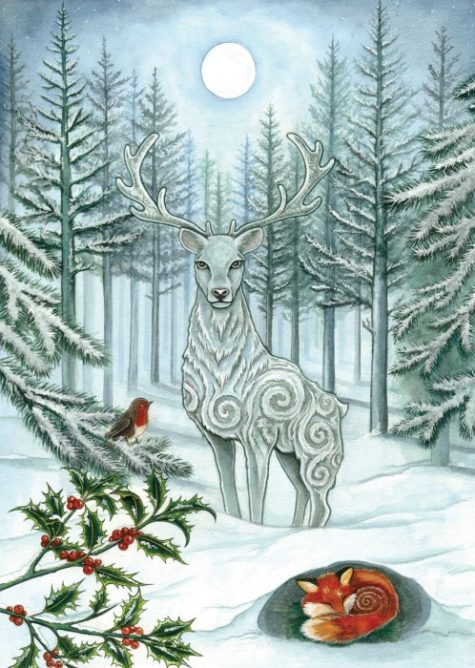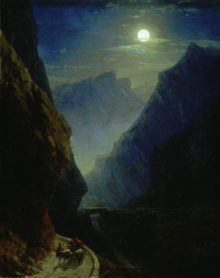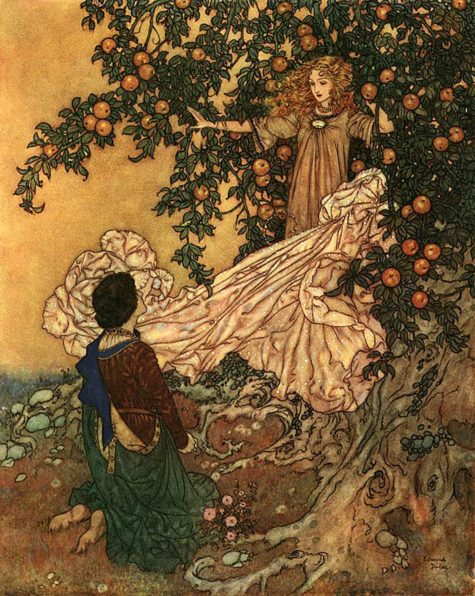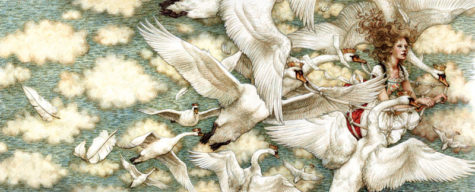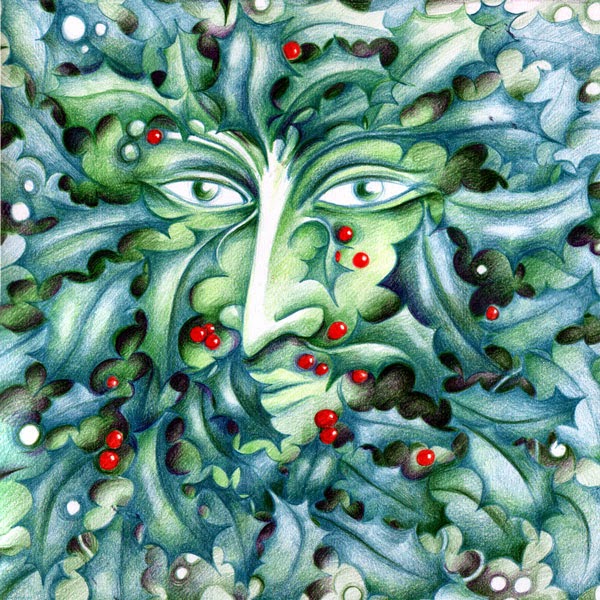Fairy Tales and Stories
A Winter Solstice Story for Children
A group of little Faeries huddled in their home deep under the roots of a giant oak tree. They were safe and snug in their tiny underground cave lined with dandelion fluff, bird feathers, and dried moss.
Outside, the wind blew cold and the snow fell softly down to cover the ground. “I saw the Sun King today,” the faerie named Rose said as she pulled her mossy cloak tighter about her. “He looked so old and tired as he walked off through the forest. What is wrong with him?
“The great oak said he’s dying” answered Daffodil.
“Dying? Oh, what will we do now?”, Little Meadow Grass started to cry, “If the Sun King dies, our little plant friends will not grow. The Birds will not come and sing again. Everything will be winter for ever!” Lilac, Dandelion and Elder Blossom tried to comfort their friend, but they were all very sad. As they huddled together, there was a knock on the tiny door.
“Open up, Faeries,” called out a loud voice. “Why are you hiding instead of joining us in our Solstice celebration?” Rose opened the door and the little gnome Brown Knobby pushed inside, shaking the glistening snowflakes off his brown coat and hat.
“We are too sad to celebrate,” Daffodil said wiping her eyes, “The Sun King is dying, haven’t you heard?”
“He is dead you silly Faeries.” Brown Knobby’s round dark eyes sparkled with laughter. “Now hurry, or we’ll be late for the celebration!”
“How can you be happy and laughing?!” Elder Blossom stamped her little foot and frowned at the gnome. “If the Sun King IS dead, it will be winter always. We will never see the Sun again!”
“Silly little child-Faeries.” Brown Knobby grabbed Dandelion by the hand and pulled her to her feet. “There is a secret to the Winter Solstice. Don’t you want to know what it is?”
Heavens to Betsy!
This is a cute but silly little story about Betsy, Christmas, Pagan Gods, and the Vatican. Enjoy!
Heavens to Betsy! A Christmas Story!
 It was Betsy’s thirteenth birthday, which was a bittersweet day for her because it was also Christmas Day. Her parents always told her they gave her twice as many gifts as they would have if her birthday was any other day, one for her birthday and one for her Christmas present.
It was Betsy’s thirteenth birthday, which was a bittersweet day for her because it was also Christmas Day. Her parents always told her they gave her twice as many gifts as they would have if her birthday was any other day, one for her birthday and one for her Christmas present.
But their hypocrisy always became apparent when they gave her a pair of shoes, that is one for each foot they said, or a pair of socks, or the weirdest gift of all—a pair of babies. Imagine her surprise and chagrin when Bob and Rob popped into her world on her birthday, which had been upstaged already by Baby Jesus. Now her birthday party and gifts would be divided between two more, and probably it would be much worse because their family was already poor and they claimed it was a stretch of the family finances to even get her some new shoes.
And for Betsy even the word “new shoes” was a cruel joke because those new shoes for her were always the old shoes that were now too small for Jesús, the boy next door named after the original Jesus. Christmas was always boo-hoo day for her.
They lived on an ancient street named for the old Roman god, Saturn. There was still a statue plinth where it was claimed Saturn once stood, but that was removed long ago and put into The Vatican, just a short walk from Betsy’s home. It was squeezed into a display room full of other old Roman gods. There they could be safely ignored, or occasionally on special days like Christmas simply mocked with little gifts placed at the foot of the statues.
What The Moon Saw
Introduction
It is a strange thing, when I feel most fervently and most deeply, my hands and my tongue seem alike tied, so that I cannot rightly describe or accurately portray the thoughts that are rising within me; and yet I am a painter; my eye tells me as much as that, and all my friends who have seen my sketches and fancies say the same.
I am a poor lad, and live in one of the narrowest of lanes; but I do not want for light, as my room is high up in the house, with an extensive prospect over the neighbouring roofs. During the first few days I went to live in the town, I felt low-spirited and solitary enough. Instead of the forest and the green hills of former days, I had here only a forest of chimney-pots to look out upon. And then I had not a single friend; not one familiar face greeted me.
So one evening I sat at the window, in a desponding mood; and presently I opened the casement and looked out. Oh, how my heart leaped up with joy! Here was a well-known face at last—a round, friendly countenance, the face of a good friend I had known at home. In, fact, it was the MOON that looked in upon me. He was quite unchanged, the dear old Moon, and had the same face exactly that he used to show when he peered down upon me through the willow trees on the moor. I kissed my hand to him over and over again, as he shone far into my little room; and he, for his part, promised me that every evening, when he came abroad, he would look in upon me for a few moments.
This promise he has faithfully kept. It is a pity that he can only stay such a short time when he comes. Whenever he appears, he tells me of one thing or another that he has seen on the previous night, or on that same evening. “Just paint the scenes I describe to you”—this is what he said to me—“and you will have a very pretty picture-book.” I have followed his injunction for many evenings. I could make up a new “Thousand and One Nights,” in my own way, out of these pictures, but the number might be too great, after all. The pictures I have here given have not been chosen at random, but follow in their proper order, just as they were described to me. Some great gifted painter, or some poet or musician, may make something more of them if he likes; what I have given here are only hasty sketches, hurriedly put upon the paper, with some of my own thoughts, interspersed; for the Moon did not come to me every evening— a cloud sometimes hid his face from me.
First Evening
Last night”—I am quoting the Moon’s own words—“last night I was gliding through the cloudless Indian sky. My face was mirrored in the waters of the Ganges, and my beams strove to pierce through the thick intertwining boughs of the bananas, arching beneath me like the tortoise’s shell. Forth from the thicket tripped a Hindoo maid, light as a gazelle, beautiful as Eve. Airy and etherial as a vision, and yet sharply defined amid the surrounding shadows, stood this daughter of Hindostan: I could read on her delicate brow the thought that had brought her hither. The thorny creeping plants tore her sandals, but for all that she came rapidly forward. The deer that had come down to the river to quench her thirst, sprang by with a startled bound, for in her hand the maiden bore a lighted lamp. I could see the blood in her delicate finger tips, as she spread them for a screen before the dancing flame.
The Garden of Paradise
There was once a king’s son who had a larger and more beautiful collection of books than any one else in the world, and full of splendid copper-plate engravings. He could read and obtain information respecting every people of every land; but not a word could he find to explain the situation of the garden of paradise, and this was just what he most wished to know.
His grandmother had told him when he was quite a little boy, just old enough to go to school, that each flower in the garden of paradise was a sweet cake, that the pistils were full of rich wine, that on one flower history was written, on another geography or tables; so those who wished to learn their lessons had only to eat some of the cakes, and the more they ate, the more history, geography, or tables they knew. He believed it all then; but as he grew older, and learnt more and more, he became wise enough to understand that the splendor of the garden of paradise must be very different to all this. “Oh, why did Eve pluck the fruit from the tree of knowledge? why did Adam eat the forbidden fruit?” thought the king’s son: “if I had been there it would never have happened, and there would have been no sin in the world.” The garden of paradise occupied all his thoughts till he reached his seventeenth year.
One day he was walking alone in the wood, which was his greatest pleasure, when evening came on. The clouds gathered, and the rain poured down as if the sky had been a waterspout; and it was as dark as the bottom of a well at midnight; sometimes he slipped over the smooth grass, or fell over stones that projected out of the rocky ground. Every thing was dripping with moisture, and the poor prince had not a dry thread about him. He was obliged at last to climb over great blocks of stone, with water spurting from the thick moss. He began to feel quite faint, when he heard a most singular rushing noise, and saw before him a large cave, from which came a blaze of light. In the middle of the cave an immense fire was burning, and a noble stag, with its branching horns, was placed on a spit between the trunks of two pine-trees. It was turning slowly before the fire, and an elderly woman, as large and strong as if she had been a man in disguise, sat by, throwing one piece of wood after another into the flames.
“Come in,” she said to the prince; “sit down by the fire and dry yourself.”
“There is a great draught here,” said the prince, as he seated himself on the ground.
“It will be worse when my sons come home,” replied the woman; “you are now in the cavern of the Winds, and my sons are the four Winds of heaven: can you understand that?”
“Where are your sons?” asked the prince.
“It is difficult to answer stupid questions,” said the woman. “My sons have plenty of business on hand; they are playing at shuttlecock with the clouds up yonder in the king’s hall,” and she pointed upwards.
“Oh, indeed,” said the prince; “but you speak more roughly and harshly and are not so gentle as the women I am used to.”
“Yes, that is because they have nothing else to do; but I am obliged to be harsh, to keep my boys in order, and I can do it, although they are so head-strong. Do you see those four sacks hanging on the wall? Well, they are just as much afraid of those sacks, as you used to be of the rat behind the looking-glass. I can bend the boys together, and put them in the sacks without any resistance on their parts, I can tell you. There they stay, and dare not attempt to come out until I allow them to do so. And here comes one of them.”
Twelve Wild Swans
Far away in the land to which the swallows fly when it is winter, dwelt a king who had eleven sons, and one daughter, named Eliza. The eleven brothers were princes, and each went to school with a star on his breast, and a sword by his side. They wrote with diamond pencils on gold slates, and learnt their lessons so quickly and read so easily that every one might know they were princes. Their sister Eliza sat on a little stool of plate-glass, and had a book full of pictures, which had cost as much as half a kingdom. Oh, these children were indeed happy, but it was not to remain so always.
Their father, who was king of the country, married a very wicked queen, who did not love the poor children at all. They knew this from the very first day after the wedding. In the palace there were great festivities, and the children played at receiving company; but instead of having, as usual, all the cakes and apples that were left, she gave them some sand in a tea-cup, and told them to pretend it was cake. The week after, she sent little Eliza into the country to a peasant and his wife, and then she told the king so many untrue things about the young princes, that he gave himself no more trouble respecting them.
“Go out into the world and get your own living,” said the queen. “Fly like great birds, who have no voice.” But she could not make them ugly as she wished, for they were turned into eleven beautiful wild swans. Then, with a strange cry, they flew through the windows of the palace, over the park, to the forest beyond. It was early morning when they passed the peasant’s cottage, where their sister Eliza lay asleep in her room. They hovered over the roof, twisted their long necks and flapped their wings, but no one heard them or saw them, so they were at last obliged to fly away, high up in the clouds; and over the wide world they flew till they came to a thick, dark wood, which stretched far away to the seashore.
James Cheney: Invocation To The Dark Mother
Daniel: Prayer Before The Final Battle
blessed obyno: Queen of Ghosts
blessed obyno: Queen of Ghosts
Caerlion Arthur: The Great, Bloody and Bruised Veil of the World
